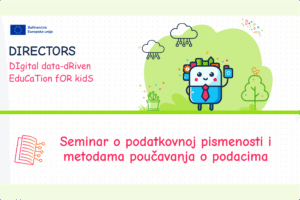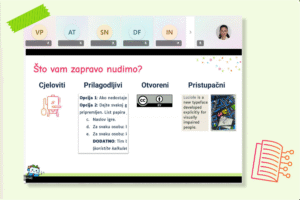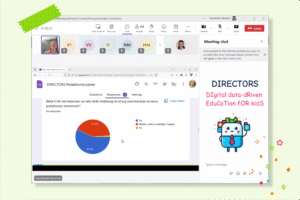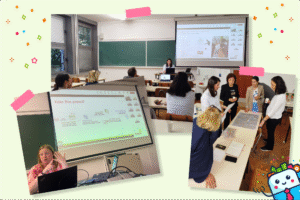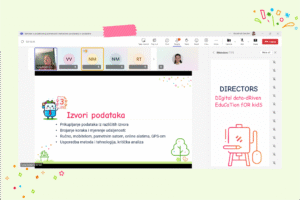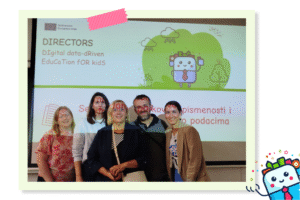A seminar on data literacy and data teaching methods was held on 14 May 2025 as part of the Erasmus+ DIRECTORS (Digital Data-driven Education for Kids) project. This event is part of Activity 6 (Technical Webinar for Teachers), which includes technical webinars for teachers, and aims to provide teachers with concrete tools and materials for implementing data literacy education. The seminar is the first in a series of two such events under this activity. The second webinar, which will take place in the Netherlands in June, will be organized by our partners from Delft University of Technology.
The seminar brought together a total of 175 participants, both live and online. The vast majority of participants were teachers and IT teachers in primary and secondary schools, a slightly smaller number were teachers of basic education or other subjects, principals, etc. The seminar lasted 90 minutes and was led by Assoc. Prof. Ivana Bosnić, PhD from the Faculty of Electrical Engineering and Computing (FER) and Assoc. Prof. Ana Kuveždić Divjak, PhD from the Faculty of Geodesy (GEOF) of the University of Zagreb.
In the introductory part of the seminar, along with a brief presentation of the project objectives and previous project activities, a survey was conducted among teachers to collect their opinions on the current level of data literacy in primary schools and their attitudes towards this topic. The survey results show that there is room for improvement in the teaching of data literacy in primary schools. Although teachers recognize the importance of this topic and feel sufficiently (56%) and more than sufficiently (20%) competent for primary teaching, they believe that the majority of students at the end of the 4th grade are not sufficiently familiar with the basic concepts of data literacy. Namely, 59% of teachers believe that students are partially familiar with concepts such as data collection, graphical representations and interpretation of simple data, while only 10% of teachers believe that students are excellently and very well familiar with these concepts. Teachers are also interested in additional professional development, especially in the form of short online seminars and always-available online courses, with 58.9% of teachers stating that they are interested in further training, and 40% of them showing conditional interest, depending on the content and duration. Teachers also believe that they lack quality educational materials and digital tools for teaching this topic, with 44.8% of teachers believing that they do not have enough quality content for teaching data literacy. They expressed the greatest need for the following digital content: manuals/textbooks (officially published), printed worksheets (officially published), additional digital content, which e.g. comes with a textbook (officially published), additional digital content available on the web (created by faculties, associations, projects…).
The seminar continued with a detailed presentation of our workshops and open educational materials. During the seminar, teachers were presented with three workshops that we have developed for lower primary school students. The workshops were experimentally conducted in two primary schools in Croatia (Marija Gorica Primary School and Vrbani Primary School) and three primary schools in the Netherlands, in collaboration with Delft University of Technology (First Cycle and Second Cycle). We carefully designed the activities within these workshops to provide students with practical experience with a “learning by doing” approach. At the seminar, we showed in detail how students go through all phases of working with data through the workshops: (1) collecting data in their own environment, (2) processing data in a “child-readable” form with error checking and possible data cleaning, (3) analyzing data by asking questions and extracting insights, (4) visualizing data for a clear presentation and encouraging spatial thinking, and (5) critical thinking and drawing conclusions based on the data.
Through the presentation, we showed teachers how they can adapt the materials to their own needs and integrate them into their teaching. All materials were developed in accordance with the learning outcomes foreseen for lower primary school grades, and teachers had the opportunity to see how they can use them in their daily work with students. All materials developed as part of the project, including educational content for the implementation of workshops, presentations, worksheets and supporting materials, are available for free download on the DIRECTORS project website.
At the end of the seminar, a participant satisfaction survey was conducted, which showed positive results with an average score of 9.85/10. 89% of participants rated the novelty of the content with high scores (8 to 10), while 87% of participants rated the seminar’s interestingness in the same way. In terms of practical benefits, 78% of participants rated the seminars as useful for their practice. Participants particularly highlighted useful ideas, such as “Ideas for drawing travel routes (e.g. route to destination, directions for tourists), work for students of the Tourism School ;))” and “Drawing on foils :), Map tasks”. Based on these results, we can conclude that the seminar was successful, with high levels of interest in applying the learned concepts in teaching.
We thank all participants for their participation and look forward to further cooperation and exchange of experiences in future project activities. We invite interested teachers to try our materials in their classrooms and share their experiences with us (info@kidsdirectors.eu). In the fall, we are planning an international webinar that will provide an opportunity for teachers from Croatia and the Netherlands to exchange experiences and network. We look forward to your participation and learning together!
